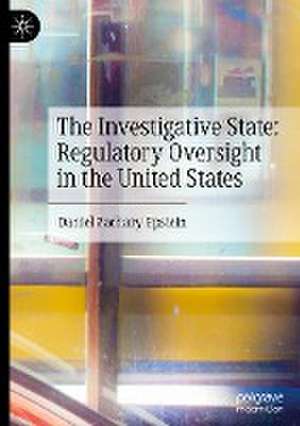The Investigative State: Regulatory Oversight in the United States
Autor Daniel Zachary Epsteinen Limba Engleză Hardback – 27 iul 2023
Preț: 695.01 lei
Preț vechi: 817.66 lei
-15% Nou
Puncte Express: 1043
Preț estimativ în valută:
132.99€ • 139.49$ • 110.71£
132.99€ • 139.49$ • 110.71£
Carte tipărită la comandă
Livrare economică 02-16 aprilie
Preluare comenzi: 021 569.72.76
Specificații
ISBN-13: 9783031384608
ISBN-10: 3031384601
Ilustrații: XIII, 163 p. 15 illus., 8 illus. in color.
Dimensiuni: 148 x 210 mm
Greutate: 0.37 kg
Ediția:1st ed. 2023
Editura: Springer International Publishing
Colecția Palgrave Macmillan
Locul publicării:Cham, Switzerland
ISBN-10: 3031384601
Ilustrații: XIII, 163 p. 15 illus., 8 illus. in color.
Dimensiuni: 148 x 210 mm
Greutate: 0.37 kg
Ediția:1st ed. 2023
Editura: Springer International Publishing
Colecția Palgrave Macmillan
Locul publicării:Cham, Switzerland
Cuprins
Chapter 1: Introduction.- Chapter 2: The American Political History and Jurisprudence Behind Congressional Delegation of the Investigative Power.- Chapter 3: Congressional Delegation of Its Power to Monitor Policy Implementation.- Chapter 4: The Politics of Overseeing the Federal Bureaucracy.- Chapter 5: Punctuated Delegation and the Politics of Administrative Law.
Notă biografică
Daniel Epstein is an Assistant Professor of Law at St. Thomas University in Miami and Director of Trust Ventures LP, USA.
Textul de pe ultima copertă
“This book should be read by anyone who is interested in the way in which the administrative state functions in the U.S. Dr. Epstein develops and explains two important points. First, that congressional oversight should be considered part of the administrative process. Second, that congressional oversight should be viewed broadly to include oversight that has been authorized by Congress in addition to congressional hearings, e.g., oversight by agency inspector generals and oversight by the public and the press through use of the Freedom of Information Act.”
— Richard J. Pierce, Jr., Professor of Law, George Washington University, USA.
This book is a timely examination of congressional oversight in the United States, serving as a definitive guide for scholars and political, legal, and media observers seeking to navigate contemporary conflicts between Congress and the White House. Author Daniel Epstein has spent his professional career as a lawyer serving all sides of the regulatory process: he ran investigations for Congress, defended the White House from congressional oversight, and represented individuals, nonprofit news organizations, and entrepreneurs in federal court to fight for regulatory transparency and fairness. Epstein uses historical and observational data to argue that the modern federal bureaucracy did not begin as a regulatory state but as an investigative state. The contemporary picture of Congress having empowered the bureaucracy to set policy through rules is a relatively recent development in the political development of administrative law. The book’s novel econometric models and historical analyses force a shift in how legal scholars and judges understand delegation, congressional oversight, and agency investigations.
Daniel Epstein is an Assistant Professor of Law at St. Thomas University in Miami and Director of Trust Ventures LP, USA.
— Richard J. Pierce, Jr., Professor of Law, George Washington University, USA.
This book is a timely examination of congressional oversight in the United States, serving as a definitive guide for scholars and political, legal, and media observers seeking to navigate contemporary conflicts between Congress and the White House. Author Daniel Epstein has spent his professional career as a lawyer serving all sides of the regulatory process: he ran investigations for Congress, defended the White House from congressional oversight, and represented individuals, nonprofit news organizations, and entrepreneurs in federal court to fight for regulatory transparency and fairness. Epstein uses historical and observational data to argue that the modern federal bureaucracy did not begin as a regulatory state but as an investigative state. The contemporary picture of Congress having empowered the bureaucracy to set policy through rules is a relatively recent development in the political development of administrative law. The book’s novel econometric models and historical analyses force a shift in how legal scholars and judges understand delegation, congressional oversight, and agency investigations.
Daniel Epstein is an Assistant Professor of Law at St. Thomas University in Miami and Director of Trust Ventures LP, USA.
Caracteristici
Forces a shift in how legal scholars and judges understand delegation, congressional oversight, and agency investigation Serves as a definitive guide for scholars and political, legal, and media observers Defends a novel theory of executive branch politics as governed by a pluralistic theory of power
